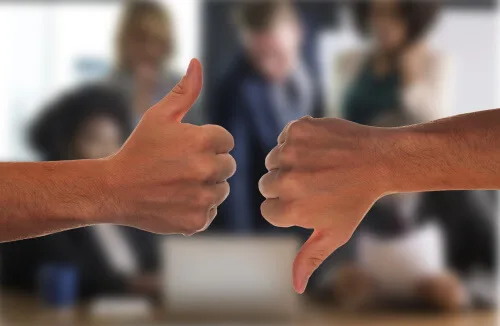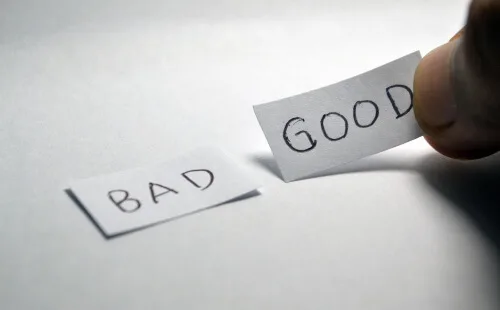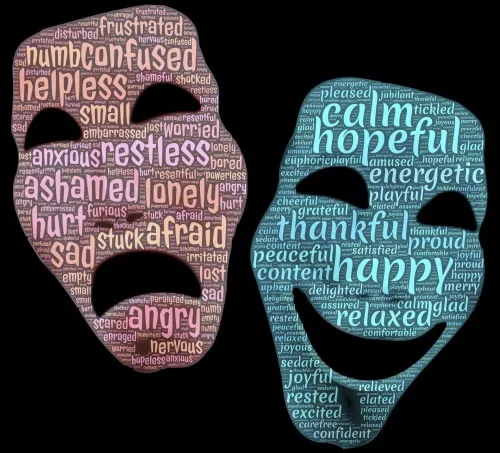4 reasons why Self-Help is harmful. Self-help can be a touchy subject. It can offer people much-needed hope and guidance during difficult times.
Table of Contents

Hi! Ian here, and welcome to this article!
Ever feel like the self-help shelf is staring you down like a judgemental gym rat? You’re not alone.
While self-improvement is a noble pursuit, lately, whispers of “self-help is harmful” seem to be swirling around the internet.
So, what’s the deal? Is self-help really the villain in our personal growth journeys?
Hold your horses, self-reflection enthusiasts! Let’s unpack this before you ditch your gratitude journal and mindfulness app.
The truth is, self-help isn’t inherently bad. In fact, many studies (check out this 2020 University of Pennsylvania research) highlight its potential to boost self-esteem, reduce stress, and even improve physical health. So, where does the “harmful” label come from?
Here’s the catch: like any quick fix, the self-help industry can sometimes oversimplify complex issues. Imagine telling someone with clinical depression to “just think happy thoughts!” Not helpful, right? This “toxic positivity” can create unrealistic expectations and fuel feelings of guilt or inadequacy when we inevitably fall short (source: Psychology Today).
Another pitfall? The pressure to constantly “optimize” ourselves. Endless productivity hacks and hustle culture mantras can leave us feeling like failures if we don’t achieve constant self-improvement. Remember, self-help should empower, not pressure. It’s about progress, not perfection.
So, should we ditch self-help altogether? Absolutely not! Instead, let’s be critical consumers. Approach self-help with a questioning mind. Does this advice resonate with you? Is it backed by evidence? Remember, you’re the expert on your own life, not some self-proclaimed guru on a book cover.
This article is just the beginning of our exploration. We’ll dive deeper into the nuances of self-help, debunk common myths, and discover effective tools for genuine growth. Stay tuned, and remember, self-improvement is a journey, not a destination. Let’s make it a mindful, compassionate, and most importantly, self-compassionate one!
The self-help industry is booming. There are now thousands of self-help books, audio programs, and workshops available, all promising to help you improve your life. But what if self-help is harmful? What if, instead of helping you achieve your goals, it makes them more difficult to reach?
There are a few reasons why self-help may be harmful. First, many self-help products make grandiose promises that they can’t possibly deliver on. They often promise instant results with little or no effort on your part. This sets you up for disappointment and discouragement when the results don’t materialize.
Second, self-help products often encourage a “quick fix” mentality. This is particularly true for products that claim to help people achieve their goals or improve their lives with little effort on their part.
However, studies have shown that the use of imagery techniques — including mental rehearsal, visualization, and positive self-talk — can be an effective way to achieve goals and improve performance. Research has shown that these techniques can be as effective as actual practice in some cases.
So rather than looking for a quick fix, it may be more beneficial to invest time in learning about and practicing these imagery techniques. Not only will this help you achieve your goals, but it can also help you maintain a positive outlook and stay positive.
People Often Turn To Self-Help Books And Programs In An Attempt To Improve Their Lives, But This Can Be Harmful
It’s no secret that people often turn to self-help books and programs in an attempt to improve their lives. Self-improvement is one of the most popular topics around, and for good reason – who doesn’t want to be happier, healthier, and more successful?
While there are many paths to self-improvement, one option that’s become increasingly popular in recent years is meditation. And while it can be tempting to try out a new program or technique on your own, doing so can be difficult – especially if you’re not sure where to start. That’s where meditation classes can come in handy.
There are a lot of different self-help books and programs out there, but not all of them are created equal. Some of them can be harmful, especially if they’re not based on scientifically proven methods.
One type of self-help book or program that can be harmful is anything that promises quick and easy results. If something sounds too good to be true, it probably is. Any program that claims you can lose 25 pounds in a month or triple your income overnight is likely to be more hype than substance.
Another type of self-help book or program that can be harmful is anything that requires you to make major life changes overnight. While it’s possible to make significant changes in a short period through sheer force of will, the best way to make lasting change is by using visualization or imagery techniques.
Imagery techniques involve picturing oneself in various situations and then rehearsing the desired response. This technique is highly effective in helping people change their behavior. For example, if you are trying to lose weight, you might picture yourself eating healthy foods and then enjoying the energy and vitality that comes with being thinner.
Alternatively, if you are trying to quit smoking, you might imagine yourself having a conversation with a friend without cigarettes in your hand. By practicing these scenarios in your head, you will be better equipped to handle them when they happen in real life.

Self-Help Can Make People Feel Like They’re Not Good Enough Or That They’re Failures
Self-help books can be a great resource for learning new techniques to improve your life, but they can also make you feel like you’re not good enough or like you’re failing. It’s important to remember that self-help books should be used as a starting point, and not as the only source of information for improving your life.
If you find that self-help books are making you feel bad about yourself, talk to a therapist or counselor who can help you work through these feelings.
If you’re feeling like you’re not good enough after reading a self-help book or trying a new program, don’t get discouraged. Remember that everyone is different and what works for one person may not work for another. Also, keep in mind that change takes time, so don’t expect to see results overnight.
Self Help Can Also Lead To Anxiety And Depression
Self-help can be a great way to improve your life, but it can also lead to anxiety and depression. It’s important to be mindful of the risks involved in self-help and to make sure that you’re taking care of yourself while you’re trying to better yourself. If you’re feeling overwhelmed by self-help, or if it’s causing more harm than good, it’s time to seek help from a professional.
It’s no secret that mental health issues are on the rise. According to the Anxiety and Depression Association of America, anxiety disorders are the most common mental illness in the U.S., affecting 40 million adults (18% of the population). And depression is not far behind, impacting 16 million adults (6.7%).
With numbers like these, it’s no wonder that self-help books are topping bestseller lists and people are flocking to counseling in record numbers.
But what many people don’t realize is that self-help can also lead to anxiety and depression. A study published in the journal Clinical Psychology Review found that reading self-help books increased levels of anxiety and depression in readers.
Instead Of Trying To Fix Everything On Your Own, It’s Important To Seek Help From Professionals
It’s no secret that seeking help is crucial to both personal and professional success. However, many people still feel the need to try to fix everything on their own. While this can be a valuable quality in some cases, it’s also important to know when to seek help from others.
Whether you’re struggling with a personal issue or encountering difficulties at work, there’s no shame in admitting that you need assistance. By reaching out for help, you’ll not only be taking the first step towards resolving your problem, but you’ll also be demonstrating your commitment to success. So don’t hesitate to ask for help when you need it.
There’s no shame in seeking out professional help when you’re struggling. It can be one of the smartest and most courageous things you can do.
Self-help books and articles can be helpful, but they often don’t offer the kind of in-depth, personal assistance that a trained professional can provide. Therapists, psychologists, counsellors, and coaches can help you understand your emotions and thought patterns, identify areas of your life that need improvement, set goals, and work through challenges.
Mental health issues can be incredibly daunting and isolating to grapple with. If you’re struggling with mental health issues, it’s important not to hesitate to reach out for help. There are many wonderful resources available to you, and there is no shame in seeking assistance. Remember that you are not alone in this struggle, and there is hope for healing.
If you’re feeling lost, stuck, or just need someone to talk to about your problems, consider reaching out to a professional for help. It could be the best decision you ever make.

FAQS
Is self-help a trap?
Yes and N0. Some self-help books can be quite helpful and provide individuals with the tools they need to improve their lives. However, some self-help books can be nothing more than pseudoscience dressed up in a neatly packaged book.
Can self-help be addictive?
Yes, self-help can be addictive. Some people become so obsessed with improving themselves that they neglect their health and relationships in favor of reading more self-help books, attending more workshops, or practicing more personal development techniques.
Can you do too much self-help?
Yes. When someone is constantly seeking out new ways to improve themselves and trying new things, they may eventually exhaust themselves both mentally and physically. It’s important to strike a balance between taking care of oneself and living a life full of joy and meaning.
Final Words
“Self-help can be a great way to learn new skills and improve your life, but it’s important to be aware of the potential for harm. Some self-help books and programs can be unrealistic, promoting quick fixes that don’t work in the long run. Others can be harmful by promoting negative self-talk or by encouraging you to compare yourself to others.
If you’re considering using self-help, it’s important to be critical of the information you’re consuming. Make sure the advice is realistic and that it comes from a reputable source. And if you feel like you’re being harmed by self-help, don’t be afraid to seek professional help.”
While self-help can be beneficial in most cases, it can sometimes be harmful. People turn to self-help books and programs when they are struggling, but this can make them feel worse.
Self-help can lead to anxiety and depression, and it’s important to seek help from professionals instead of trying to fix everything on your own. If you’re struggling, please reach out for help. You’re not alone.
Wishing you Health, Wealth, and Happiness
